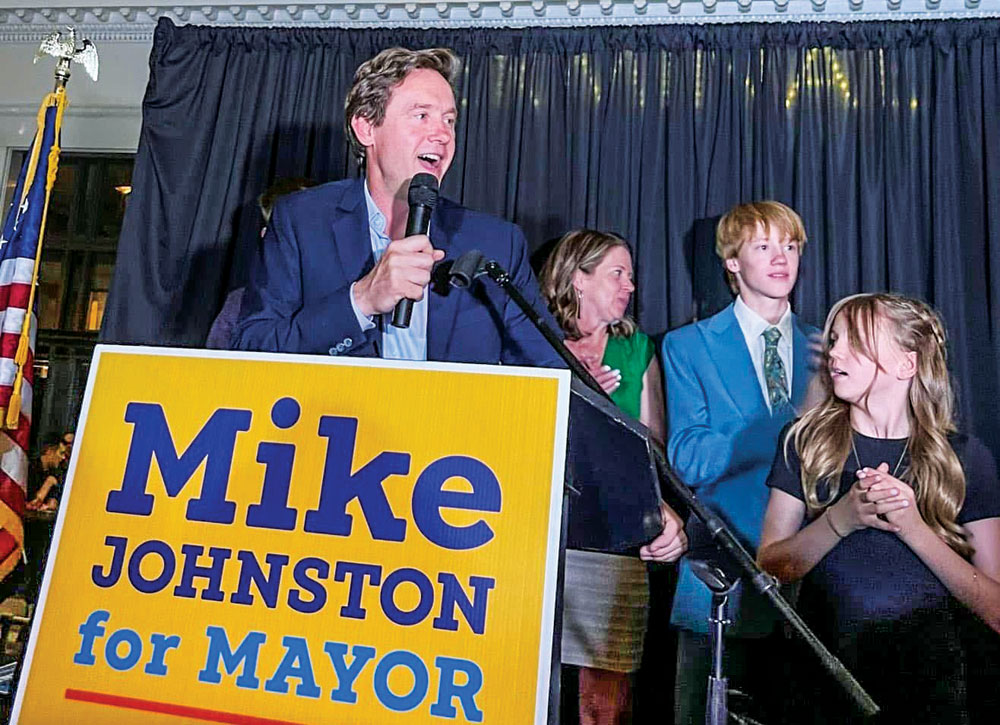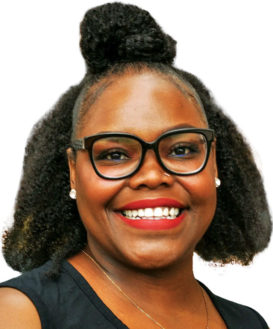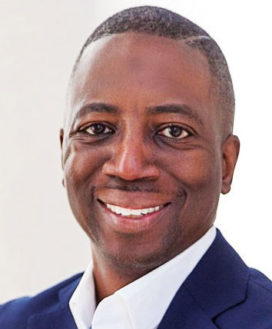
On June 6, Mike Johnston won the mayoral race by a comfortable 55%-45% margin. The Denver voter turnout of 37 percent was lower than the April election and the 2019 municipal election. Photo courtesy of Mike Johnston for Mayor
After several months of campaigning and two rounds of voting, the results of the 2023 Denver elections have been certified and the leaders of our communities have been determined. Mike Johnston will serve as the new Denver Mayor and become the first new occupant of the mayor’s office in 12 years. Northeast residents also decided which candidates should serve on the City Council, with Shontel Lewis winning the race for District 8 and Darrell Watson earning the seat for District 9. Many factors contributed to the dynamics of the election, the patterns of the voters, and the outcomes of the races.
Mayor’s Race
Support from Endorsements
The types of endorsements that were accumulated seemed to impact the level of support for the candidates. Most of Brough’s endorsements came from business interests, real estate organizations, and even Republican groups. In contrast, Johnston was able to consolidate the progressive vote by receiving endorsements from most of the progressive mayoral candidates who weren’t able to get past the first round, such as Lisa Calderon, Leslie Herod, Terrance Roberts, and Ean Tafoya.
The Influence of Money
The prevalence of money in the mayoral race demonstrated the failures of the Fair Election Fund. The fund was approved by Denver voters in 2018, and it encouraged candidates to receive small donations that would then be matched by taxpayer money. The goal was to reduce the influence of wealthy donors on the races and enable more grassroot candidates to run for office. But the Fair Election Fund couldn’t account for independent expenditure committees that were not affiliated with the mayoral campaigns and that could raise limitless donations for their preferred candidates. As a result, these groups injected substantial funds into the mayoral race, with Brough raising $1.4 million and Johnston trouncing that by raising $4.9 million.
Both candidates attacked the fundraising patterns of their rivals for opposite reasons. Advancing Denver generated funds for Johnston, with most of its donors living outside of Colorado, including Michael Bloomberg in New York and LinkedIn founder Reid Hoffman from California. Brough’s team claimed it was wrong for Johnston to let these outside donors impact the outcome of the Denver election. A Better Denver raised money for Brough and was mostly filled with donations from local business interests, including Republicans Pete Coors and Philip Anschutz. Johnston’s team claimed that Brough taking money from local businesses could increase their influence over the policies of the Denver government.

Shontel Lewis
City Council District 8 (Central Park, Northeast Park Hill, and East Colfax)
The City Council races in the runoff election featured contests between moderates versus progressives. In District 8, Shontel Lewis was the progressive candidate going against Brad Revare as the moderate alternative. The closeness of the results was a dramatic aspect of this race. Although Revare had an early lead on Election Day, his slim margin diminished throughout the night as the late ballots from progressive voters got counted. This helped Lewis make a comeback, take the lead, and win the seat with a 51%-49% victory.
“I feel such an immense amount of gratitude, humility, and responsibility,” says Councilwoman-elect Shontel Lewis. “I’m glad folks showed their belief in what I’ve been saying by electing me, I’m ready to serve the people, and I’m ecstatic that I can lead for the next four years.”
Lewis is also confident that her experience serving on the RTD board will help her effectively transition onto the City Council. “For the first time, my past and where I am today makes sense,” says Lewis. “I’ve done so many different things, including gang reduction, youth services, housing stability, the economics office, and workforce development. But I’ve never had just one interest in terms of specific issues. I understand the threads and interconnectedness of all these issues, and my experience makes me uniquely prepared to navigate this position.”

Darrell Watson
City Council District 9 (South and North Park Hill, North Denver, and Five Points)
The race for the District 9 seat was the most intense contest of the election cycle. Candi CdeBaca was an incumbent councilmember and Democratic Socialist who was being challenged by the more moderate Darrell Watson. But CdeBaca garnered a controversial reputation during her first term as many critics claimed that she used divisive rhetoric, harbored extreme positions, and cast obstructive votes.
These controversies caused donors to get heavily involved with this race to oppose CdeBaca and support Watson, as the $1.2 million dollars that Watson raised more than doubled that of CdeBaca and was the most of any city council candidate. On Election Day, the outcome of the race was especially shocking due to the size of the blowout. Watson wound up defeating CdeBaca by a 61%-39% margin, which was the second-largest margin of victory in a runoff election over the past decade.
“When we saw the final number at 61 percent we knew it was not simply a validation of our messaging, but it was a validation on the people within District 9,” says Councilman-elect Darrell Watson. “They communicated clearly that what wins in District 9 is progress, bringing people together, and really listening and working together on solutions. I was overjoyed because that was not just some small win—it was an unprecedented win—and so I look forward to leveraging this as a mandate for change within District 9, for how we engage with the community, and that positive message is the way we’re going to continue leading.”
Watson is now fulfilling many tasks to complete the transition process and prepare for his new role. “We’re meeting with other councilmembers so I can form deeper levels of relationships, get feedback and input from leaders, and understand the council culture and how things work,” says Watson. “But I’m also a numbers person, so I’m really digging into the specific data within our district so I have a better sense of where our 311 call volumes occur, our success rates with responsiveness to communities, and where we’re stuck and need to provide more support.”


0 Comments